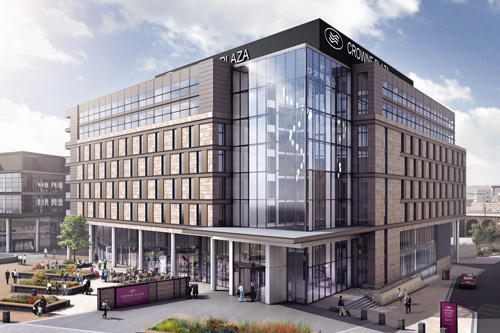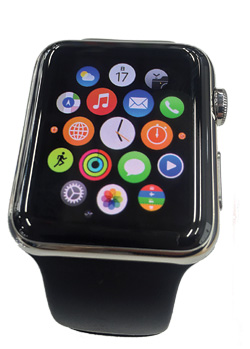Top technology for switched-on hotels
How best do you meet your guests' needs for high-quality in-room entertainment? Rosalind Mullen reports
It seems like only yesterday that charging guests for in-house movies and Wi-Fi was regarded as a valid revenue stream. Frankly, any hotel with that strategy today would haemorrhage guests.
"With regard to Wi-Fi, I think guests now see it as much of an amenity as providing shower gel, and I tend to agree. There are significant costs associated with providing this facility, but for me, it is a cost of doing business," says David Connell, general manager at South Lodge in West Sussex, part of Exclusive Hotels & Venues.
The real problem, however, is staying abreast of trends in in-room entertainment. Technology now moves so quickly that almost everyone owns multiple mobile devices and the latest smart TV.
"Many hotels cannot keep up with this pace when they have to make purchases so often and for so many rooms. Upgrading Wi-Fi at home is relatively inexpensive, but for a hotel it is tens of thousands of pounds," says Connell, who is also Exclusive's IT champion.
But surely at a country house hotel, guests would be happy to unplug for a while? Not so, it seems. Even though the five-star retreat has two award-winning restaurants, some guests still choose to stay upstairs with room service and in-room entertainment. And that keeps the pressure on.
"We are creating a home-from-home. People need to feel relaxed, but there is a level of expectation because at home people are updating their TVs every few years," says Connell.
So, investment in technology at the 89-bedroom hotel is ongoing. Two years ago, Connell put Sky HD boxes into every room and he is constantly upgrading the TVs, which have to be hospitality-ready. Fast-running Wi-Fi is crucial, too, with £60,000 invested last year in new routers and plans to upgrade again next year.
That said, he points out that the more established technologies are getting cheaper. For instance, £30,000 has been spent on broadband lease lines and he is now negotiating a move up from 100mbps to 1,000mbps for the same price.
Exclusive Hotels also recently installed Crave tablets at South Lodge and Pennyhill Park, Surrey, and will be rolling these into Lainston, Hampshire, and the Manor,Windsor.
"Not only do tablets give our guests an interactive experience where they can order room service, choose their favourite pillows or play Angry Birds," says Connell, "it also allows us to push sales messages to them, such as late availability in our Michelinstarred restaurant or treatments in the spa. This, together with constant investment in Wi-Fi and upgrading in-room TVs and other tech, will be our priority."
Looking ahead, he hopes to extend the use of tablets into public areas, which will speed up the order process for the guest and make service more efficient. Next on the investment list is a new property management system, but that will be not happen until 2016-2017.
"It used to be easy for hotels to provide differentiators to what someone might have at home. Movies on demand and internet access through your TV were not commonplace in people's homes 10 years ago, but now it is and it is harder for hotels to keep up. The level of investment for an 89-bedroom hotel is almost impossible," says Connell.
Rather than getting too clever, he strives to ensure that any in-room technology the hotel does offer works well and is fast. And he regards technology less as revenue-generating and more as a marketing tool.
"From a PR and marketing perspective, having on-demand service free of charge will do more for driving sales than the revenues generated by charging for it." says Connell.
The price of connectivity
But there are ways that hoteliers can make money without looking like money-grabbing dinosaurs.
"From an income standpoint, a variety of bandwidth and access plans can be put in place," says Mark Teasdale, chief technology officer at hospitality technology supplier Acentic. "For instance, lower level access can be delivered free, whereas when the guest or conference requires more bandwidth, chargeable access plans can be tailored accordingly, delivering valuable revenues to the hotel."
Similarly, some guests will be prepared to pay for premium TV or movies on demand and these have historically been lucrative revenue streams. However, with the advent of mobile technology and on-line streaming there will be less demand for this unless it is provided free of charge.
"The move now is away from traditional pay TV and expensive internet protocol TV solutions. Guests want to access their own content at their convenience; streaming to or from a laptop or mobile device, or using a hotel TV with on-demand apps such as BBC iPlayer built in," he says. "Why have expensive sports or movie channels in your hotel if the guest can already access that content through an app on their mobile device?"
A lot of Boxbuild's success in working with hotel groups such as Bloc is through its focus on providing free Wi-Fi, high-speed internet access, smart TV and - more unusually - tablet room controls for lighting, airconditioning, audio visual and hotel services.
There's an app for that
"We see these moving onto the guest's own mobile device and tapping into the Internet of Things [or connectivity] to create a seamless and personalised guest experience," says Holmes. "Increasingly, smart devices can connect to anything, from the TV to the lights, air-conditioning, locks, check-in and so on."
"The reality is that we will see connectivity as an expectation," says Holmes.
Looking ahead, there is scope for mobile and web solutions that deliver a seamless digital experience across the whole user journey; from booking to checkout.
"We are building on our existing mobile apps and Internet of Things hospitality solutions. We are also partnering with Salto Systems to be the first to bring mobile key solutions to the UK market. Integrating mobile and web applications with hotel front and back of house systems will be critical to achieving this successfully," says Holmes.
Crowne Plaza Newcastle prioritises bandwidth
As the new 251-bedroom hotel gears up to open this summer, general manager Andrew Fox explains that high-speed internet access (HSIA) will be a top priority for guests.
What is your target guest profile?
Mainly business travellers. Our hotel will offer the largest state-of-the-art conference and banqueting space in the city. Acentic's Radiant 4 platform, which is designed to deal with ever-growing guest connectivity, will allow us to deliver that.
What in-room entertainment will be provided?
We are using Panorama NG, which delivers content, and smart Samsung Hospitality TVs. We also have Acentic's Push and Play technology, which allows guests to stream their own content from their mobile device to the TV.
What do you think guests look for in terms of in-room technology?
We know that our guests will be looking for top-quality HSIA connectivity, particularly when working late. At the same time, we do not underestimate the importance of relaxing, so we want to enable our guests to enjoy their favourite content.
How will you keep abreast of the pace of change and prioritise your investment?
By asking and listening to customers, including future customers - the millennials. We have IT experts who continually review customer feedback and embrace emerging trends to plan the hotel room of the future.
Who will manage HSIA at the hotel?
The hotel team will manage it - after training.
Is bandwidth a big concern?
Yes. However, it is also about us making the most of the capacity we have and that we allocate the appropriate amount to the highest demand areas. Conference areas will, for example, require more during the day with a movement towards the bedrooms and public areas in the evening.
What are the current trends in terms of in-room entertainment?
Guests want to link their mobile device with the TV in their room. On our Club floor we are deploying Apple TV boxes in the rooms so guests can stream content to their TV from their Apple device. In other rooms, Push & Play will have a similar level of functionality. Guest expectation for on-demand and choice continues to grow because of what can be accessed at home. I think customers will expect to make the synchronisation of personal information the norm.
What's next?
There is going to be a massive growth in "wearable technology", predicts Mark Teasdale, chief technology officer at Acentic, which has clients such as IHG and Hilton.
"The Apple Watch is going to be a game-changer. We know that the way it works, with a tiny antennae constantly looking for a signal, will make demands on the high-speed internet access (HSIA) infrastructure."
And it is unlikely to end there. The message, in short, is that hoteliers need to invest in their HSIA infrastructure so they are able to keep pace with growing demands.
"The savvy hotelier realises that the days of looking at HSIA infrastructure every three or four years have gone. They know that HSIA is now the fourth utility of the hospitality sector," says Acentic's chief executive Richard Robinson.
With 75% of guests bringing Wi-Fi-equipped devices, Robinson adds that there is demand from guests to be able to access content on their mobile devices and play it back through the in-room TV. And this doesn't just rely on robust HSIA, but on hotels introducing apps such as Push & Play or Apple TV boxes.













